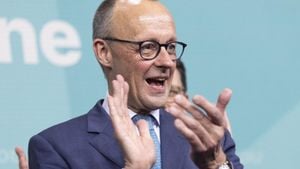WASHINGTON (AP) — President Donald Trump is currently holding talks with French President Emmanuel Macron and British Prime Minister Keir Starmer during a pivotal week marking the third anniversary of Russia's invasion of Ukraine. At this time of increased uncertainty, Trump is reshaping American foreign policy, effectively sidelining European leadership as he aims to hasten the conclusion of the conflict.
Trump’s meetings reflect broader geopolitical strains, as he has controversially made demands for various territories, including Greenland, Canada, Gaza, and even the Panama Canal, alongside aspirations for securing precious rare earth minerals from Ukraine. Reportedly, the U.S. has provided about $180 billion in aid to Ukraine since the onset of the war, emphasizing the stakes involved.
“It looks like we’re getting very close,” Trump remarked, addressing reporters as his discussions with Macron began. He expressed hopeful sentiments about the impending resolution of the conflict and indicated the possibility of Ukrainian President Volodymyr Zelenskyy visiting Washington soon to finalize deals concerning Ukraine’s resources.
This week’s international convergence holds significant weight, not only for its historical annotations but amid fears concerning the U.S. retreating from its long-held commitments. Analysts are raising alarms over Trump’s rhetoric and actions potentially undermining decades of diplomatic precedents. “The only conclusion you can draw is... blown up without any sort of discussion or reflection,” noted Ian Kelly, a former U.S. ambassador.
Accompanying this apprehension is the decision for U.S. officials to initiate talks with Russian representatives without including Ukrainian or other European factions—a move that's been met with significant discontent among allies. Macron, before his meeting with Trump, declared the necessity of maintaining firmness against Russian aggression. He stated, “You can’t be weak in the face of President Putin. It’s not you, it’s not your trademark, it’s not in your interest.”
Adding to the mix are Zelenskyy’s critiques of Trump’s mischaracterization of Ukraine's role since the war began. Recently, the Ukrainian leader indicated on social media, “We are making great progress… we want a good economic deal.” His remarks come amid expectations for security guarantees intertwined with any agreements on resource access.
Trump, during his discussions, reiterated his belief in the potential for peacekeepers from Europe being accepted by Russia if the necessary agreements are reached. “Yeah, he will accept it,” Trump asserted, showing optimism contrary to historical tensions wherein Moscow has rebuffed such proposals as significant security threats.
Despite the complicated legacy of U.S. foreign policy, there is palpable concern about the radical shifts under the Trump administration. Military, economic, and moral standing of the U.S. has forged its post-World War II identity, which critics argue could be dismantled at the hands of rapid policy changes. Trump’s administration, dubbed by some as “destabilizers,” continues to provoke skepticism from both international agencies and longtime diplomats.
Looking forward to his upcoming session with British Prime Minister Starmer, the discussions about Ukraine's future and American involvement are likely to intensify. After projecting harsh criticism onto Zelenskyy for not pushing for negotiations with Putin, Trump’s rhetoric continues to reshape the contours of international diplomacy.
Macron’s approach is poised not just on Russian dynamics but also on how these negotiations will mirror U.S.-China relations going forward. He cautioned Trump: “How can you then be credible in the face of China if you’re weak in the face of Putin?” Trump’s open admiration of Russian leadership leaves room for trepidation among allies who foresee the adverse effects these discussions may invoke.
Preparations for negotiation are being navigated through charged political undercurrents—where perceived weakness might not only embolden aggressors but also complicate Western unity. Trump remains optimistic, “I may be wrong, but I believe he wants to make a deal,” bolstering the narrative of possible collaboration, yet the road to durable peace remains precarious.
The coming days will undoubtedly shape the dialogue surrounding Ukraine and set the stage for the next chapter of U.S. foreign engagement—one striving for balance between national interests and collaborative obligations.



